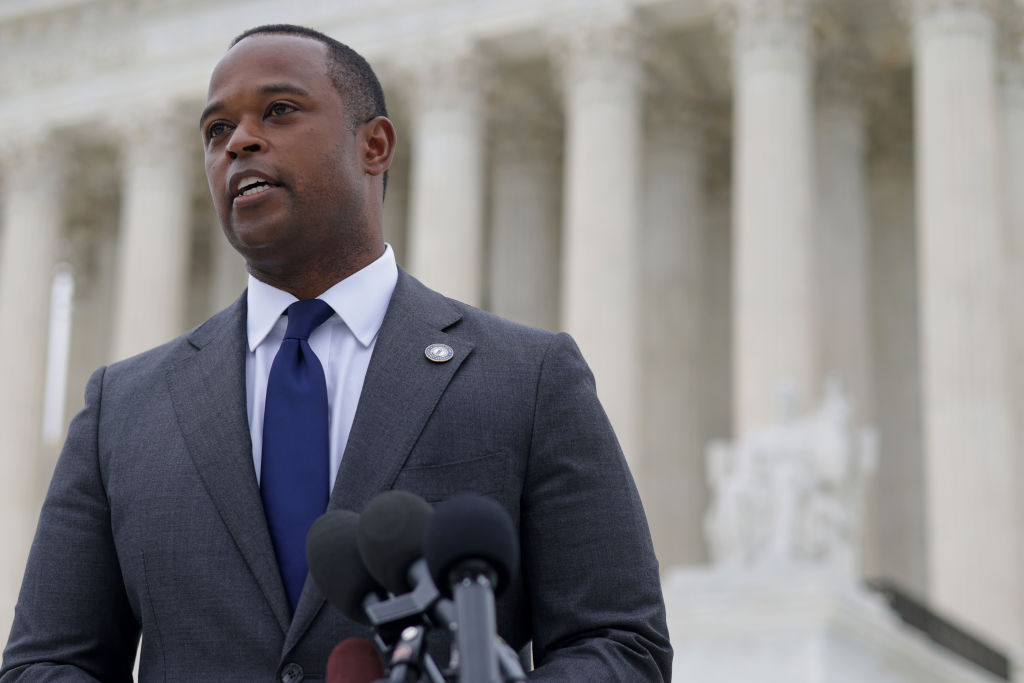Daniel Cameron Wants Supreme Court To Bend Procedure So He Can Restrict Abortion In Kentucky
Source: Alex Wong / Getty
All eyes are on the Supreme Court with oral arguments in the Mississippi Abortion case scheduled for Dec. 1. But a procedural question in a Kentucky case could be another deciding moment in the fight for abortion.
Cameron v. EMW Women’s Surgical Center is an example of how procedure and regulations can be used to whittle away at the right to an abortion. While the focus nationwide has been on “saving” the landmark abortion case Roe v. Wade, restrictions such as targeted abortion provider restrictions (trap) laws and other procedural mechanisms stand in the way of the right to choose for women and pregnant people.
The only reason this case is before SCOTUS is because Andy Beshear (D) became governor in 2019
As Kentucky AG, Beshear chose not to appeal a court’s decision blocking an abortion restriction. Now AG Daniel Cameron (R) is trying to uphold the restriction https://t.co/6LzX0yoqgT https://t.co/AO4J2bgeHD
— susan rinkunas plancpills.org (@sueonthetown) October 12, 2021
The case involves current Kentucky Attorney General Daniel Cameron and EMW Women’s Surgical Center, the only abortion clinic in the state.
In this case, Cameron seeks to revive litigation pertaining to a law banning a procedure commonly performed in abortions occurring after 14-weeks. Passed in 2018, the law was previously declared unconstitutional in large part because it is effectively an impermissible pre-viability ban.
NBC News reported Tuesday afternoon that Justices seemed willing to let Cameron resume litigation noting that Chief Justice John Roberts and Justice Stephen Breyer both raised concerns about limiting the ability of incoming elected officials the opportunity to take an action if they have a different interpretation.
The justices’ concerns raise an interesting question about how state elected officials should prioritize their duties in upholding state law. It also highlights an interesting dynamic of whether partisan considerations take priority in determining what is or isn’t within an officials lawfully elected duties.
Usually, attorney generals and other statewide elected officials are constitutional officers. And while partisan inclinations may guide how state officials engage, the partisan nature of decision-making doesn’t mean there are unlimited attempts to defend a law when a process has run its due course.
It will be interesting if the justices consider the fact that even after Cameron was elected, the state’s health official, a Democratic appointee, defended the law at the Sixth Circuit Court of Appeals where it was struck down.
We were in court this morning defending our right to abortion.
The court will determine whether the Kentucky attorney general can continue his quest to force people to carry pregnancies against their will.
Here’s what you need to know.https://t.co/AXaVFlTcf5
— ACLU (@ACLU) October 12, 2021
Representing the EMW Women’s Surgical Center, the ACLU has framed this current legal dance as another effort by anti-abortion politicians to erode abortion access.
While the basic issue before the Supreme Court is a procedural matter, the underlying issue is whether a previously determined unconstitutional law can be revived. As Amy Howe, former editor and writer for SCOTUSblog, explained Cameron believes that his “authority to defend state law when no other official will” supersedes
But as attorney general, Gov. Andy Beshear was within his right to decline to appeal an earlier decision. This could be a different conversation if before the end of the appeal process Cameron decided to insert his right to defend the law.
Continuity of government is important and there should be some ability to rely on the decisions taken by officials regardless of party affiliation. Counsel for the abortion clinic also argued that Cameron is not without procedural recourse if he seeks to address the prior litigation of the underlying law.
The clinic simply argues his attempt to come into the process after an appeal has concluded is improper. From its viewpoint, and that of several experts who wrote a supporting brief, this could open the gate for others to wait until a case is finished to try to reopen the decision.
See Also:
Abortion Justice Marches Leverage National Network In Support Of State And Local Organizing
[ione_media_gallery id=”4222155″ overlay=”true”]

